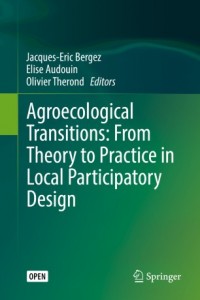Elise Audouin(editor)
Elise Audouin is an agroecologist within INRA (French National Institute for Agricultural Research), unit AGIR (AGroecologies, Innovations & teRritories). Her main expertise is on development and facilitation of participatory process for supporting stakeholders in designing agroecological transition. She specialized on the conception of participatory methods, representation modes, intermediary objects design and scientific mediation. She develop and facilitated 24 workshop so far with 412 participants in contrasted contexts (Europe, Central America and the Carribbean, Scandinavian countries; Africa); and on contrasted topics (specific agroecological farm pratices; organic consumption; chain impacts; holistic agroecological project) and scales (from farm to city, department to production chain).Elise Audouin is an agroecologist within INRA (French National Institute for Agricultural Research), unit AGIR (AGroecologies, Innovations & teRritories). Her main expertise is on development and facilitation of participatory process for supporting stakeholders in designing agroecological transition. She specialized on the conception of participatory methods, representation modes, intermediary objects design and scientific mediation. She develop and facilitated 24 workshop so far with 412 participants in contrasted contexts (Europe, Central America and the Carribbean, Scandinavian countries; Africa); and on contrasted topics (specific agroecological farm pratices; organic consumption; chain impacts; holistic agroecological project) and scales (from farm to city, department to production chain).

Top selling books
You may also be interested in these books written by the same author
About Elise Audouin(editor)
Elise Audouin is an agroecologist within INRA (French National Institute for Agricultural Research), unit AGIR (AGroecologies, Innovations & teRritories). Her main expertise is on development and facilitation of participatory process for supporting stakeholders in designing agroecological transition. She specialized on the conception of participatory methods, representation modes, intermediary objects design and scientific mediation. She develop and facilitated 24 workshop so far with 412 participants in contrasted contexts (Europe, Central America and the Carribbean, Scandinavian countries; Africa); and on contrasted topics (specific agroecological farm pratices; organic consumption; chain impacts; holistic agroecological project) and scales (from farm to city, department to production chain).
Most Popular
Agroecological Transitions: From Theory to Practice in Local Participatory Design
There is wide agreement on the need to change the prevalent agricultural models, given their negative impacts and their incompatibility with current societal issues. Agroecological transition has been promoted as a potential solution to the ecological, social and economic problems generated by these models. It however involves a systemic, multi-scale and transdisciplinary process. Due to this complexity, the overall picture of what farms and food systems “actually are” and “might be” may not be apparent at the individual level. Yet individuals’ knowledge and values provide complementary insights on how to proceed in deepening ecological modernisation. Expertise can also provide landmarks to be considered in that process. Because local stakeholders’ experience and skills are key resources in the adaptation and adoption of agroecological transition, new conceptual and methodological frameworks and tools have to be developed to support them in the design process of such a complex transition. This book presents feedback from the ‘Territorial Agroecological Transition in Action’- TATA-BOX research project, which was devoted to these specific issues. The multidisciplinary and multi-organisation research team steered a four-year action-research process in two territories of France. This book presents: i) the key dimensions to be considered when dealing with agroecological transition: diversity of agriculture models, management of uncertainties, polycentric governance, autonomies, and role of actors’ networks; ii) an operational and original participatory process and associated boundary tools to support local stakeholders in shifting from a shared diagnosis to a shared action plan for transition, and in so doing developing mutual understanding and involvement; iii) an analysis of the main effects of the methodology on research organisation and on stakeholders’ development and application; iv) critical analysis and foresights on the main outcomes of TATA-BOX, provided by external researchers.”


